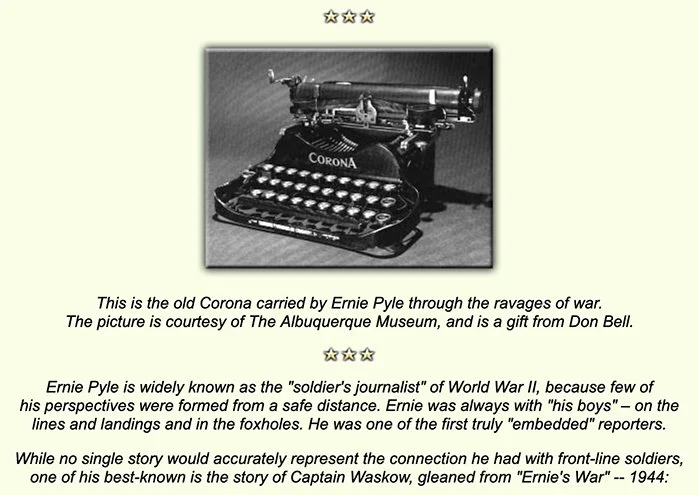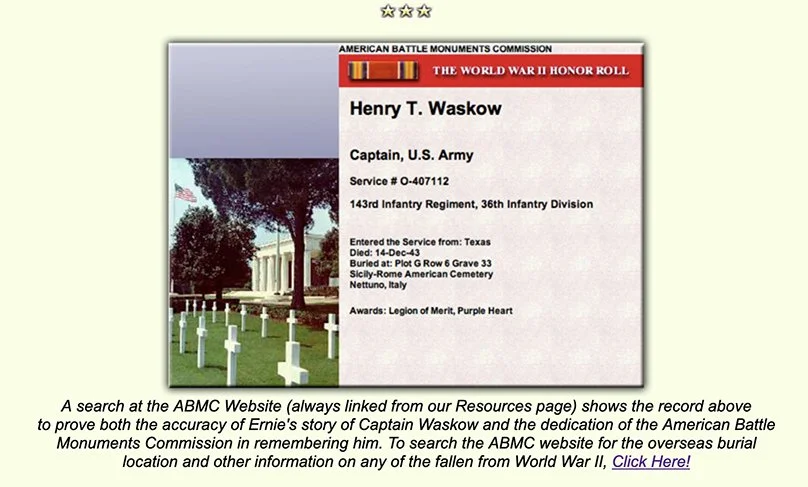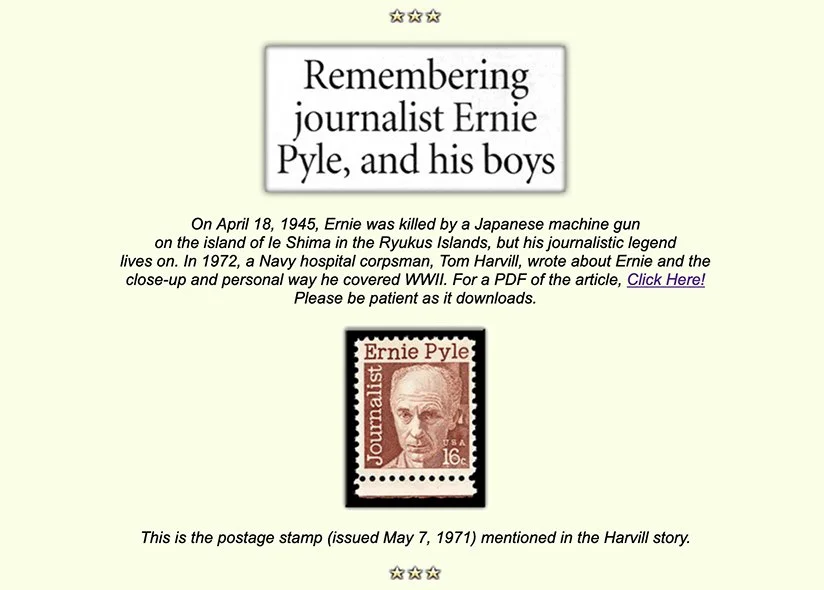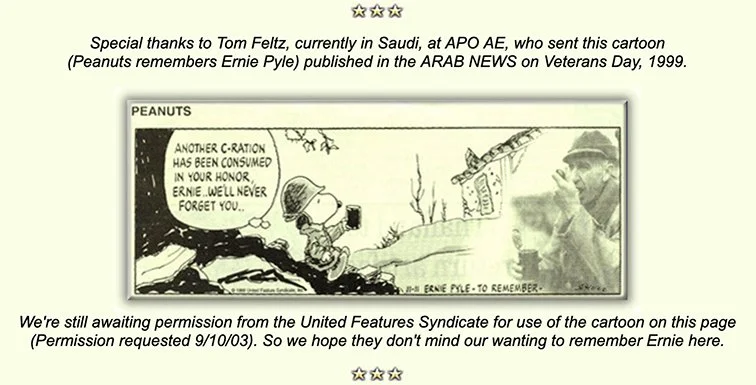Ernie Pyle
The Captain Waskow story
"At the Front Lines in Italy, January 10th, 1944 . . .
In this war I have known a lot of officers who were loved and respected by the soldiers under them. But never have I crossed the trail of any man as beloved as Capt. Henry T. Waskow of Belton, Texas.
Capt. Waskow was a company commander in the 36th Division. He had led his company since long before it left the States. He was very young, only in his middle twenties, but he carried in him a sincerity and gentleness that made people want to be guided by him.
"After my own father, he came next," a sergeant told me.
"He always looked after us," a soldier said. "He'd go to bat for us every time."
"I've never known him to do anything unfair," another one said.
I was at the foot of the mule trail the night they brought Capt. Waskow's body down. The moon was nearly full at the time, and you could see far up the trail and even part way across the valley below. Soldiers made shadows in the moonlight as they walked.
Dead men had been coming down the mountain all evening, lashed onto the backs of mules. They came lying belly-down across the wooden pack-saddles, their heads hanging down on the left side of the mule, their stiffened legs sticking out awkwardly from the other side, bobbing up and down as the mule walked.
The Italian mule-skinners were afraid to walk beside dead men, so Americans had to lead the mules down that night. Even the Americans were reluctant to unlash and lift the bodies at the bottom, so an officer had to do it himself, and ask others to help.
The first one came early in the morning. They slid him down from the mule and stood him on his feet for a moment, while they got a new grip. In the half light he might have been merely a sick man standing there, leaning on the others. Then they laid him on the ground in the shadow of the low stone wall along the road.
I don't know who that first one was. You feel small in the presence of dead men, and ashamed at being alive, and you don't ask silly questions.
We left him there beside the road, that first one, and we all went back into the cowshed and sat on water cans or lay on the straw, waiting for the next batch of mules.
Somebody said the dead soldier had been dead for four days, and then nobody said anything more about it. We talked soldier talk for an hour or more. The dead man lay all alone outside in the shadow of the low stone wall.
Then a soldier came into the cowshed and said there were some more bodies outside. We went out into the road. Four mules stood there, in the moonlight, in the road where the trail came down off the mountain. The soldiers who led them stood there waiting. "This one is Captain Waskow," one of them said quietly.
Two men unlashed his body from the mule and lifted it off and laid it in the shadow beside the low stone wall. Other men took the other bodies off. Finally there were five lying end to end in a long row, alongside the road. You don't cover up dead men in the combat zone. They just lie there in the shadows until somebody else comes after them.
The unburdened mules moved off to their olive orchard. The men in the road seemed reluctant to leave. They stood around, and gradually one by one I could sense them moving close to Capt. Waskow's body. Not so much to look, I think, as to say something in finality to him, and to themselves. I stood close by and I could hear.
One soldier came and looked down, and he said out loud, "God damn it." That's all he said, and then he walked away. Another one came. He said "God damn it to hell anyway." He looked down for a few last moments, and then he turned and left.
Another man came; I think he was an officer. It was hard to tell officers from men in the half light, for all were bearded and grimy dirty. The man looked down into the dead captain's face, and then he spoke directly to him, as though he were alive. He said "I'm sorry, old man."
Then a soldier came and stood beside the officer, and bent over, and he too spoke to his dead captain, not in a whisper, but awfully tenderly, and he said:
"I sure am sorry, sir."
Then the first man squatted down, and he reached down and took the dead man's hand, and he sat there for a full five minutes, holding the dead hand in his own and looking intently into the dead face, and he never uttered a sound all the time he sat there.
And finally he put the hand down, and then reached up and gently straightened the points of the captain's shirt collar, and then he sort of rearranged the tattered edges of his uniform around the wound. And then he got up and walked away down the road in the moonlight, all alone."
Following AWON member Roger Connor's description of Ernie Pyle Days -- August 11, 2000 -- in Dana, Indiana -- to celebrate what would have been Ernie Pyle's 100th Birthday, Charlie Bartels, a member of the 6th Armored Division, sent this letter to Roger that characterizes the kind of reporter Ernie Pyle really was.
"I met Ernie Pyle during the final battle of WWII, Okinawa."He was the Soldier's friend, he conducted his interviews right where it was happening, on the front line. That is where we met. The enemy was about 100 yards away.
"We were using flame throwers, grenades, satchel charges and machine guns. He wrote the story as he saw it happening, not at the bar in some Officers Club on a secured Island. We were still cleaning up the Island of Ie Shima, adjacent to Okinawa. Ernie Pyle was killed by a sniper that had not disclosed his location until that fatal shot. This was one of the hazards that we faced daily with this enemy.
"Ernie was so loved and respected by the troops that they found the means to build a wooden coffin for his burial, all others were buried in body bags when available. I believe he was a veteran of WWI or perhaps he had later Military Service. His final resting place was the Punch Bowl National Military Cemetery near Honolulu Hawaii. At the time I was stationed at Hickam AFB."
Meanwhile, thanks to several AWONers for your submissions,
as Ernie Pyle will continue to be remembered on these pages.





